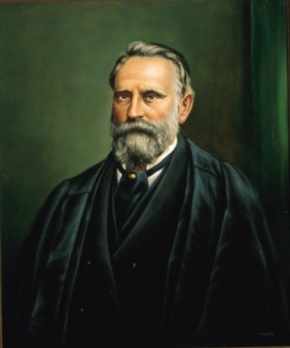You are here
Circuit Court Opinions:
Associate Justice Stanley Matthews, Pepper v. Labrot (1881)

Pepper v. Labrot, 8 F. 29 (C.C.D. Ky. 1881) [Sixth Circuit]
Pepper was a trademark case involving Kentucky whiskey. In the 1830s, the plaintiff’s father, Oscar Pepper, operated a distillery on his property in Woodford County. His distiller, James Crow, developed “Old Crow,” one of Kentucky’s earliest bourbons. The product became extremely popular and had many famous devotees, including general and later president Ulysses S. Grant. Old Crow is still sold today, although its original formula died with James Crow and the brand has changed ownership several times.
After Oscar Pepper’s death, his son, James Pepper, acquired the property and built a new distillery on the site. He named the distillery “Old Oscar Pepper Distillery,” after his father. A trademark burned into each barrel of whiskey he produced read “Old Oscar Pepper Distillery. Hand Made Sour Mash. Jas. E. Pepper, Proprietor. Woodford County, Ky.” He also used the name “Old Oscar Pepper Distillery” and the term “O.O.P.” in marketing his product. Pepper registered his trademark in 1877.
Soon after, Pepper went bankrupt and sold the property, including the distillery and all its equipment, to the defendants, Labrot and Graham. He then began making whiskey at a new location. The defendants began using a mark on their whiskey barrels similar to that Pepper had used. It read, “Old Oscar Pepper Distillery. Established 1838. Hand Made Sour Mash. Labrot & Graham, Proprietors. Woodford County, Kentucky.” Pepper sued Labrot and Graham, claiming that they had infringed his trademark with the motive of deceiving the public into believing that their allegedly inferior whiskey was the same as his. The defendants countersued, claiming that they had exclusive rights to the name “Old Oscar Pepper Distillery” and that for the plaintiff to use it in reference to his new location would be fraudulent.
The crux of the dispute was the parties’ disagreement as to what the name in question represented. Pepper asserted that he used the name to distinguish the whiskey he made from all other brands and that his whiskey had acquired a superior reputation under that name. Labrot and Graham countered that the name referred to the place where the whiskey was made, which they now owned, and not to the product itself. While the use of the word “distillery” clearly supported an inference that the defendants’ assertion was correct, the plaintiff claimed that he used that word to indicate that his product was a straight whiskey and not compounded.
Justice Matthews found the plaintiff’s claim unpersuasive. In addition to noting the plain meaning of the words, he pointed out that the plaintiff’s marketing had focused extensively on the location in which the whiskey was made. In an attempt to take advantage of the favorable reputation of the whiskey made when his father owned the property, James Pepper advertised that his whiskey was made in the same place, using water from the same spring, wheat from the same farm, and even the same still. “It remains quite certain, from the proofs in this case” Matthews wrote, “that the complainant succeeded in establishing a market for his manufacture, upon the special belief of the public that it must be like that made by his father, because made at the same locality and with all the advantages it was thought to confer.”
Finding that the terms “Old Oscar Pepper Distillery” and “O.O.P.” referred to the place where the plaintiff formerly manufactured his whiskey and the defendants currently manufactured theirs, Matthews ruled that the defendants held the exclusive legal rights to those terms. The Old Oscar Pepper Distillery closed during Prohibition, reopened in 1935, and was sold in 1940. It then lay dormant for decades before reopening in the 1990s under another name. James Pepper built a distillery bearing his name in Lexington, Kentucky, which became very successful. The distillery closed in 1967 but reopened when an entrepreneur revived the James E. Pepper brand in 2017.
